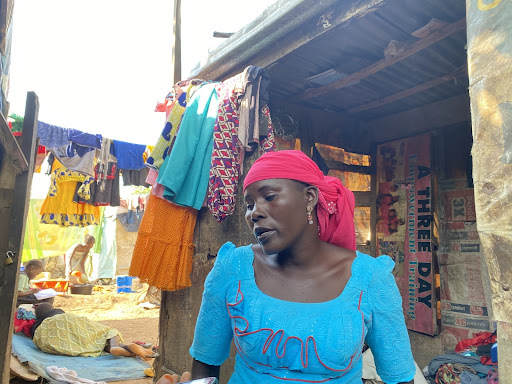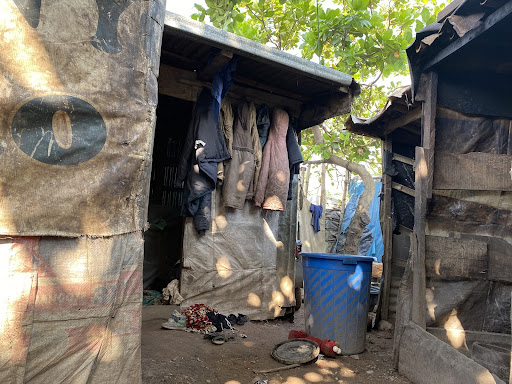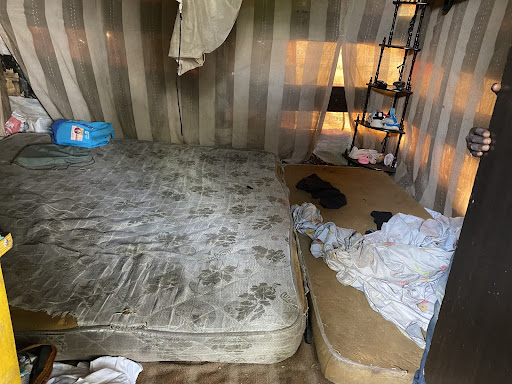Abuja IDP Struggles With Life After Surviving Boko Haram Invasion
She is passionate about her children’s education, believing her condition would’ve been significantly better had she gone to school herself. But, with nine children to take care of, there simply aren't enough resources.

Ladi Mathias, a 40-year-old mother of nine, appeared optimistic about the future as she narrated her ordeal. She had fled a Boko Haram invasion of her hometown, Gwoza, in Nigeria’s northeastern state of Borno, and sought refuge in a camp in Abuja, Nigeria’s capital.
The devastating conflict in the region has directly led to tens of thousands of deaths since 2009. The fatality runs into nearly 350,000 if indirect deaths are included, according to the United Nations Development Programme (UNDP).
Ladi is one of the over two million people forcibly displaced by the brutal Boko Haram insurgency that has disrupted livelihoods and ravaged many communities in the northeastern states of Borno, Adamawa, and Yobe
“We moved to Abuja in 2014 when Gwoza was attacked,” she explained, adding that it was a terrible experience.
Gwoza Local Government Area (LGA) is located in southern Borno near the Mandara mountain range between Nigeria and Cameroon. Gwoza town, the local government headquarters, is about 135 kilometers southeast of Maiduguri.
Growing security threats and Boko Haram’s subsequent overrunning of the town in 2014 led to the killing of hundreds of people and the displacement of locals to Adamawa, Maiduguri, and Cameroon. The extremist group made Gwoza its headquarters before a military operation led to its recapture in March 2015.
The Boko Haram nightmare and Ladi’s escape
“Life was easier back then,” Ladi told HumAngle.
“We lived a better life. We had businesses we were doing. We had farmlands, and cattle we were rearing. We could afford hospital bills and school fees. Whenever we ran out of money, we could easily sell one or two animals and fend for ourselves. Life has never been the same since the attack.
“I can never forget that particular night,” Ladi added amidst tears. “They slaughtered two of my elder brothers before my eyes. This is an incident I would never forget. We the women were the ones who buried their remains.”
Recalling the horrors, she said many people were killed, mostly men and young boys, mentally ill, and old people too.
At the time of the traumatic experience, Ladi was nursing her eighth child as she had given birth a few months before.
“When the attack began we started hiding in the caves but when it got worse we ran away,” she said. The displaced people trekked to Cameroon through the night. Since she had some money with her, she was able to board a car to Abuja with her family from the neighbouring country.

Finding refuge in Abuja’s shanty town
Ladi now has nine children with her husband Mathias. They live in a makeshift shanty camp hosting displaced persons located in Kuchigoro, a suburb town near the highway connecting Abuja’s airport and the city centre.
The community is some kilometers from the affluent districts and the Three Arms Zone, an area designated for policymakers and the site of the Nigerian government.
She narrates her difficult ordeal and how awful it has been while seated in their makeshift home at the Internally Displaced Persons (IDP) camp, more than 700km from her hometown, Gwoza.
“Life has never been the same since then. I have been struggling to fend for my family, nine children to take care of. One happens to be a sickle cell patient,” she said in a downcast tone.
Ladi says taking care of him, in particular, has not been an easy task.
“I spend a lot of money on him alone. Two years ago when he fell ill, I spent more than ₦100,000 on blood transfusion and other medications. Most of the money I earn goes to taking care of him,” she lamented.

Her first child recently graduated from secondary school while the second child is also done with junior secondary school. The third child finished primary school but couldn’t continue because of his illness.
Ladi engages in farming to earn a living, but IDPs in Abuja do not have access to farmlands except in the neighbouring villages. She travels to a community in Nasarawa State during the farming season where they lease lands for planting. Nasarawa is one of the states bordering Nigeria’s capital city.
“What I harvest is what we eat. Sometimes, if I get enough, I sell some part of it. At the end of the day, I’m left with little or no money because I have to pay for the rent,” she lamented.
Ladi also makes money through preparing and selling akara, a local snack, and grinding foodstuff using a machine. She uses her earnings to take care of expenses, including her children’s school fees.
“I would love my children to further their education. Every parent would love to see their children succeed. I wouldn’t want my children to go through what I went through.”
She is passionate about her children’s education, believing her condition would have been significantly better had she gone to school herself.
She urged the government to help IDPs in her situation.
“The only help I want is for my sickle cell patient to be looked after and all my children to continue with their education,” she pleaded. “I’m hoping to leave this place. The place is not conducive. One of the things that trigger Bawa’s illness is the cold. As you can see, we don’t have the solution to that problem here.”
Support Our Journalism
There are millions of ordinary people affected by conflict in Africa whose stories are missing in the mainstream media. HumAngle is determined to tell those challenging and under-reported stories, hoping that the people impacted by these conflicts will find the safety and security they deserve.
To ensure that we continue to provide public service coverage, we have a small favour to ask you. We want you to be part of our journalistic endeavour by contributing a token to us.
Your donation will further promote a robust, free, and independent media.
Donate HereStay Closer To The Stories That Matter




